COMPARISONS of LANGUAGES INVOLVED
in the translation of the MAALAN AARUM |
| INTRODUCTION |
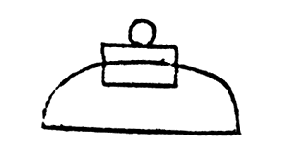
3.1 |
|

3:2 |
They lived where it snowed.
They lived where it stormed.
They lived where it was always winter. |

3:3 |
While still in their cold land
They remembered longingly
the mild weather,
the many deer,
and also foxes |
| HUNTERS GO EVERYWHERE |
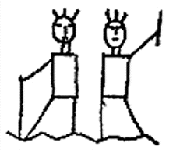
3:4 |
The poor, lonely, but tough men
became hunters and
left those living
in strong houses.
|

3:5 |
Separated from home
like breasts on the same body
the hunters became tougher
extremely good and
they reached for the sky. |

3:6 |
The hunters camped
in the north, east,
south and west. |
| CHRIST TRUMPS ODIN |
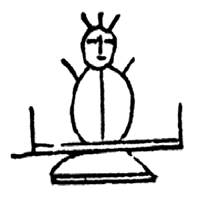
3.7 |
The man, who ruled
in that old, northern land
that they all left,
was baptized to be pure. |
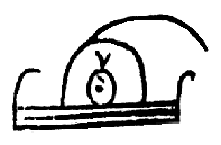
3.8 |
The discouraged people
were worried about
worn out land
they had to abandon.
The priest said,
"We decent people
should go somewhere else."
|
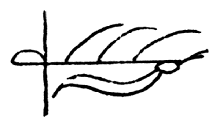
3.9 |
The common people
in the east stole away
the brothers
abandoned all
with great discouragement
and again discouragement |

3.10 |
In a short while
the weeping, weak, dirty.
needy (people from)
the burnt land
saved themselves and
rested on the other side |

3.11 |
After moving down
from the snowy land
and discreetly leaving
the cousins separated
through out all the land |
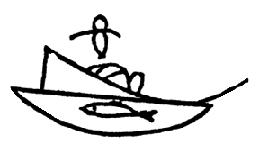
3.12 |
Where there was little
pack ice in heaped ice
with a lot of snow drifts,
the white geese ruled
and the white bear ruled |
| Maalan Aarum |
Algonquin |
Old Norse |
Namesaugipek
pokhapokhapek
guneunga
waplanewa
ouken
waplamewi
ouken |
Nama sugge paka
pokha pokha paka
gu’newun ka
wapi (niska)
ogima
wapi(musqi)
ogima |
Nema soekkva buka
bakki bakki buka
korn foen ka
verpa (niska)
hoega madh
verpa (musqi)
hoega madh |
 |
|
 |
The fathers of
[remain]
[rich In fish]
(the bald eagle)
along the sea
{and the white wolves}
and muscles |

original English
translation

translation
of Old Norse |
Not compressed pack ice
banked banked pack ice
snow drifts a lot
White geese
high man (ruler)
white bear
high (ruler) |
WORD (PHRASE) BY WORD (PHRASE) DECIPHERMENT
(All references are to Sherwin’s eight volumes of the Viking and the Red Man) |
| Original English |
The fathers of |
|
| Recorded sounds |
Name saugi pek |
|
| Algonquin words |
Nama sugge paka |
v. 4 p. 91, v4. p. 136 1* |
| Old Norse |
Nema soekkva buka (is) |
& v. 2. p. 108 |
| Norse/English |
Not compressed pack ice |
1* 2* |
| |
|
|
| Original English |
remain |
|
| Recorded sounds |
pokha pokha pek |
|
| Algonquin words |
pokha pokha paka |
v. 2 p. 172 & p.108 |
| Old Norse |
bakki bakki buka |
|
| Norse/English |
banked banked pack ice |
3* |
| |
|
|
| Original English |
rich in fish |
|
| Recorded sounds |
gun eun ga |
|
| Algonquin words |
gu’n ewun ka |
v. 6 p. 30 & v. 4. p. 106 |
| Old Norse |
korn foen ka |
|
| Norse/English |
snow drifts a lot |
|
| |
|
|
| Original English |
the bald eagle |
|
| Recorded sounds |
wapla newa |
|
| Algonquin words |
wapi (niska) |
v. 5 p. 162 & |
| Old Norse |
verpa (niska) |
North American Indian, p. 206 |
| Norse/English |
White geese |
4* |
| |
|
|
| Original English |
along the sea |
|
| Recorded sounds |
ouke n |
|
| Algonquin words |
ogi ma |
v. 1 p.135 & v. 3p. 34 |
| Old Norse |
hoega madh |
|
| Norse/English |
high (ruler) |
5* |
| |
|
|
| Original English |
and the white wolves |
|
| Recorded sounds |
wapla mewi |
|
| Algonquin words |
wapi (musqi) |
v. 5 p. 162 & |
| Old Norse |
verpa (musqi) |
North American Indian, p. 206 |
| Norse/English |
white bear |
4* |
| |
|
|
| |
and muscles |
|
| |
ouke n |
|
| |
ogi ma |
v 1 p.135 & v 3 p. 34 5* |
| |
hoega madh |
|
| |
high (ruler) |
|
Notes |
| 1* The Algonquin word “paka” means “to strike.” The modern Norwegian dictionary has the word “pakkis,” which means “pack ice.” Floating ice that strikes (boats) is a better description of “pakkis” than ice that is packed together.
An examination of Sherwin’s list of “p-k-” Algonquin words came down to “paka” as the word similar in sound to “pek” A good hypothesis may be that “pek” was originally “pakkis” because the Walam Olum word “pek” is used repeatedly in sentences about frozen water.
The “is” syllable may have been lost by historians who did not know about “striking ice.” The knowledge of “pakkis” would have been unimportant to the sixteen generations of Algonquin/Norse people who roamed the solid land of America.
Until a better explanation appears, “pek” will be deciphered to be the same as modern “pakkis.” |
2* Note the distinct difference between the original English phrase and the decipherment via the Old Norse. The Old Norse words describe features of an open water marvel, which the pictograph appears to illustrate. |
3* The Old Norse description in these two phrases, “Not compressed pack ice – banked, banked pack ice” is probably the best short description of an open water marvel, which has open water in the midst of thick ice. |
| 4* The Algonquins appeared to name animals and birds by imitating the sounds they made. “Niska” is the Cree name for goose. The original creator of the Walam Olum was probably describing a white goose. When the Historian and the Recorder tried to record verbal history in Indiana, the bald eagle was a good, but wild, guess based on their experience.
In the same way, the white animal was certainly not a wolf. The name is closer to the names given to bears by the Cree and Algonquin tribes. |
| 5* Although “ogima” was used by the Algonquins for “chief” the word had “extensive and indefinite application.” [Faries]. In this verse “ogima” appears to mean an important bird and animal near an open water marvel. |
| General Comments: |
The variation of the original English words from the Algonquin/Old Norse meanings may be because the Historian and the Recorder did not fully resolve the meanings of the original sounds. They may not have known about open water marvels and “pek.”
They should have been able to recognize “ogima,” a well known Algonquin word, but perhaps the memorized sound had morphed and the word was used in association with birds and animals. They may have guessed that the “ouken” word was associated with the fish in the pictograph. The fish in the pictograph appears to be there to illustrate that the bears are sitting on a floating ice berg.
The survival of the original sounds and their correspondence to known Algonquin/Old Norse phrases is a testament to the honest effort of the Historian and Recorder to preserve the verbal history. Also it is a testament to Reider T. Sherwin who collected and correlated Algonquin/Old Norse sounds and meanings.
This verse about the open water marvel appears to be out of sequence. The verse fits better between “saved themselves and rested on the other side” (verse 10) and “moving down from the land of the snow (verse 11)” Somewhere in the memorizing generations the pictograph sticks for verses 11 and 12 may have been switched. |
| back to top |
|
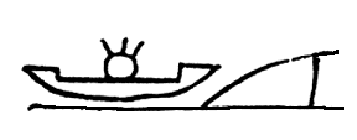
3.13 |
Floating up the streams
in their canoes,
our fathers were rich.
They were in the light
when they were at these Islands. |
| THE DECISION |

3.14 |
"Head Beaver and Big Bird
said 'Let us go to Akomen'" |
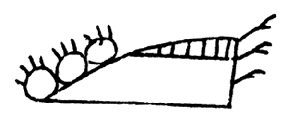
3.15 |
All say they will go along,
All who are free to go. |
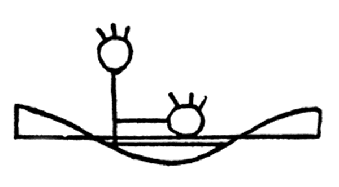
3.16
|
Those of the north agreed.
Those of the east agreed.
Over the waters
Over the frozen sea
They went to enjoy it |
| THE MIGRATION |

3.17 |
On the wonderful slippery water,
On the stone hard water, all went
On the great tidal sea,
Over the [puckered pack ice] |
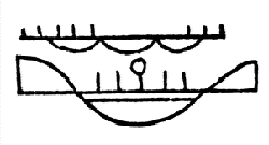
3.18
|
[I tell you it was a big mob]
In the darkness,
all in one darkness
To Akomen, to the [west],
In the darkness
They walk and walk,
all of them |
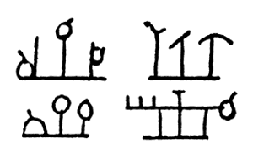
3.19 |
The men from the north,
the east, the south,
The eagle clan, the beaver clan
the wolf clan,
The best men, the rich men,
the head men
Those with wives,
Those with daughters,
Those with dogs |

3.20 |
They all come.
They tarry at the land
Of the spruce pines,
Those from the east
Some with hesitation.
Esteeming highly their
Old home at the mound land |



















